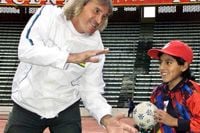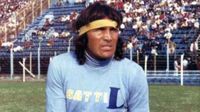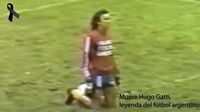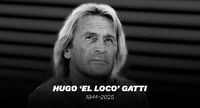Hugo Orlando Gatti, one of the most iconic goalkeepers in Argentine football history, passed away on April 20, 2025, at the age of 80 in Buenos Aires. Known affectionately as 'El Loco', Gatti's career spanned over two decades, during which he became a household name not only for his extraordinary skills on the field but also for his vibrant personality and unique style.
Gatti's life came to a tragic end after a prolonged hospitalization that began following a street accident while he was walking his dog. This incident led to hip surgery, but complications arose post-operation due to a severe respiratory infection, which ultimately claimed his life. His son, Lucas Gatti, poignantly remarked, "My dad died, in truth, eight months ago, when my mom went to heaven. He has gone in peace and fought until the last moment." This statement reflects the deep emotional impact of his mother's passing on Gatti, who had been married to Nacha Nodar for 50 years before her death in 2024.
Born on August 19, 1944, in Carlos Tejedor, Argentina, Gatti began his professional career at Atlanta in 1962. However, it was at River Plate where he first gained prominence, playing four seasons before moving to Gimnasia y Esgrima La Plata and then Unión. His most successful years came with Boca Juniors, where he played from 1976 to 1988. During his time with Boca, Gatti won two Copa Libertadores, one Intercontinental Cup, and three national championships, solidifying his status as a club legend.
Gatti's playing style was revolutionary for his time. He was known for his willingness to leave the penalty area and play the ball with his feet, a tactic that would later become a hallmark of modern goalkeeping. His daring approach earned him a reputation as a risk-taker, but he also had a knack for making spectacular saves, including a signature move dubbed 'La de Dios', where he would challenge forwards one-on-one by coming out on his knees.
Despite his impressive club career, Gatti's international appearances were limited. He represented Argentina in 18 matches, including the 1966 World Cup in England, where he served as the third goalkeeper. Gatti was notably left out of the 1978 World Cup squad, a decision that haunted him for years. Coach César Luis Menotti favored Ubaldo Matildo Fillol, leaving Gatti to ponder what could have been had he been given the opportunity to shine on the world stage.
After retiring from professional football in 1988, Gatti transitioned into a successful media career. He became a familiar face on Spanish television, particularly known for his roles on shows like El Chiringuito and Punto Pelota. His outspoken nature and sharp commentary made him a beloved figure among fans, as he often provided bold analyses and unfiltered opinions on the game and its players. His distinctive style and charisma kept audiences engaged, and he remained a relevant voice in football discussions until his health began to decline.
Gatti's legacy extends beyond his achievements on the pitch. He was a cultural icon in Argentina, embodying the spirit of a generation that loved football not just as a sport but as a way of life. His flamboyant personality, characterized by his long hair and eclectic fashion choices, set him apart from his contemporaries. He was known for his eccentricities, such as driving a car with a sunroof and making headlines with his bold statements, including a memorable quip about Lionel Messi: "Next to the players I saw, Messi doesn’t exist."
His contributions to football were recognized not only through his records but also through the affection he garnered from fans. Gatti holds the record for the most games played in the Argentine first division, with an astonishing 765 appearances over 25 seasons. This feat speaks volumes about his durability and commitment to the sport he loved.
In the wake of his passing, tributes have poured in from across the football community, with many reflecting on the profound impact Gatti had on the game and its culture. His unique approach to goalkeeping and his vibrant personality will be remembered fondly by those who witnessed his career. Gatti's influence on the sport is undeniable, and his legacy will continue to inspire future generations of players and fans alike.
As Argentina mourns the loss of one of its most beloved figures, the football world remembers Hugo Gatti not just as a goalkeeper, but as a true pioneer who changed the way the position is perceived. His contributions to Boca Juniors, River Plate, and the Argentine national team are etched in history, and his spirit will forever resonate in the hearts of football enthusiasts.










